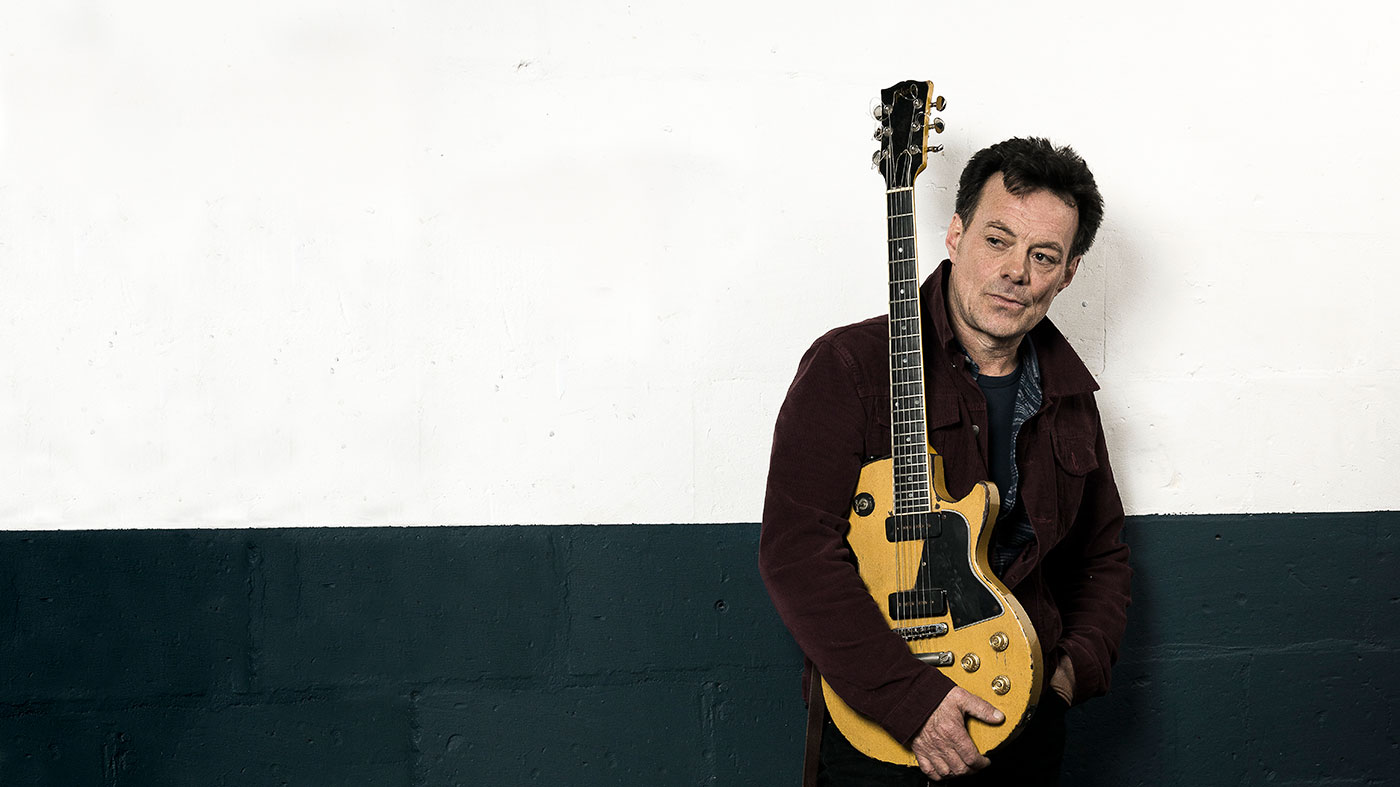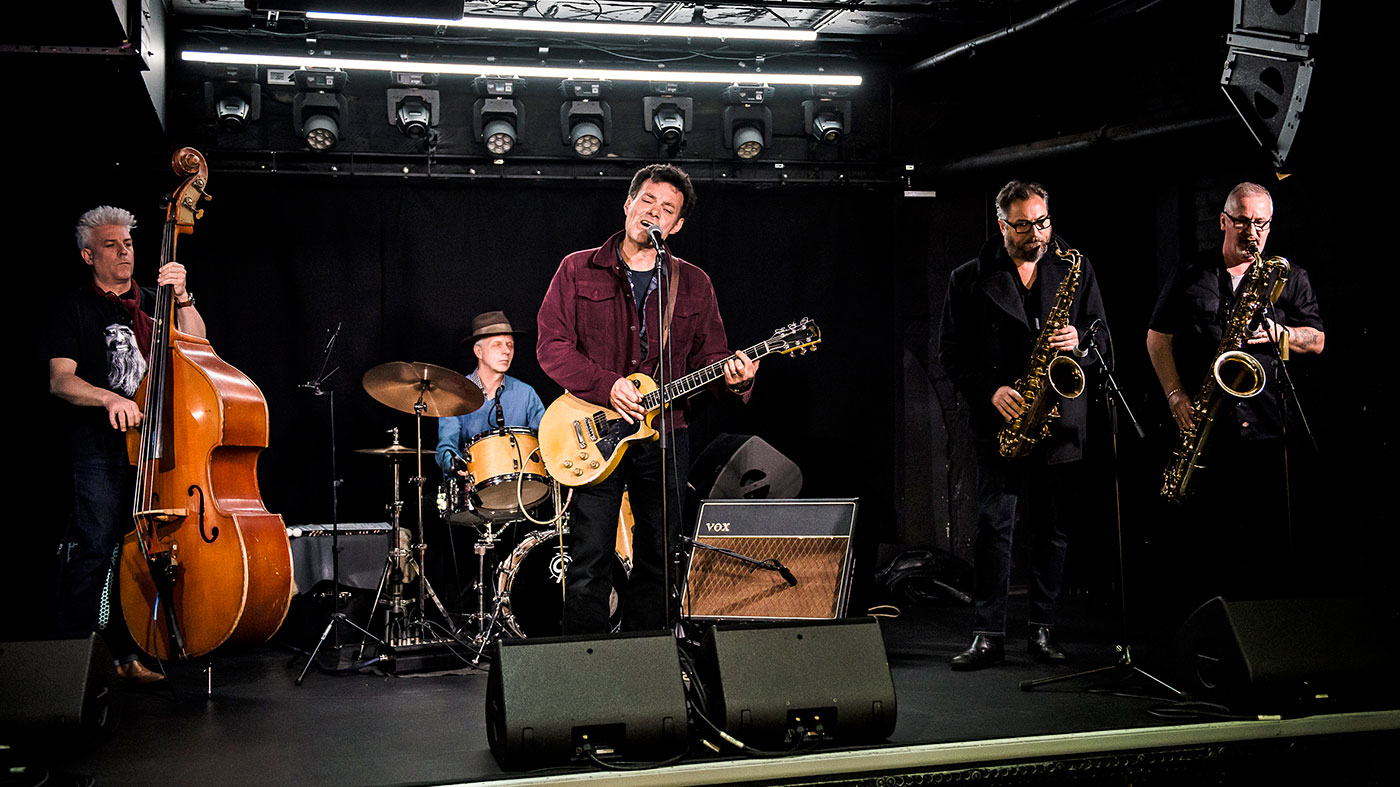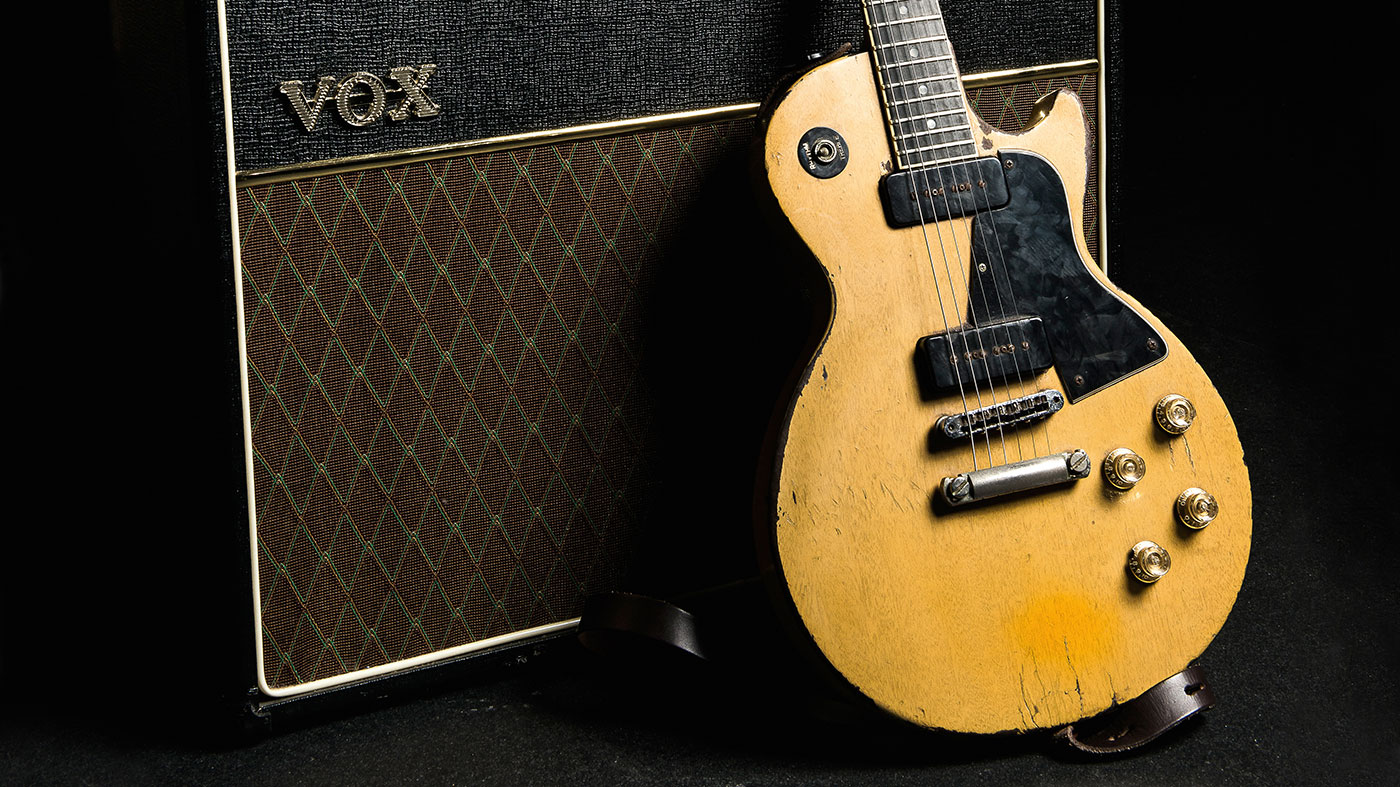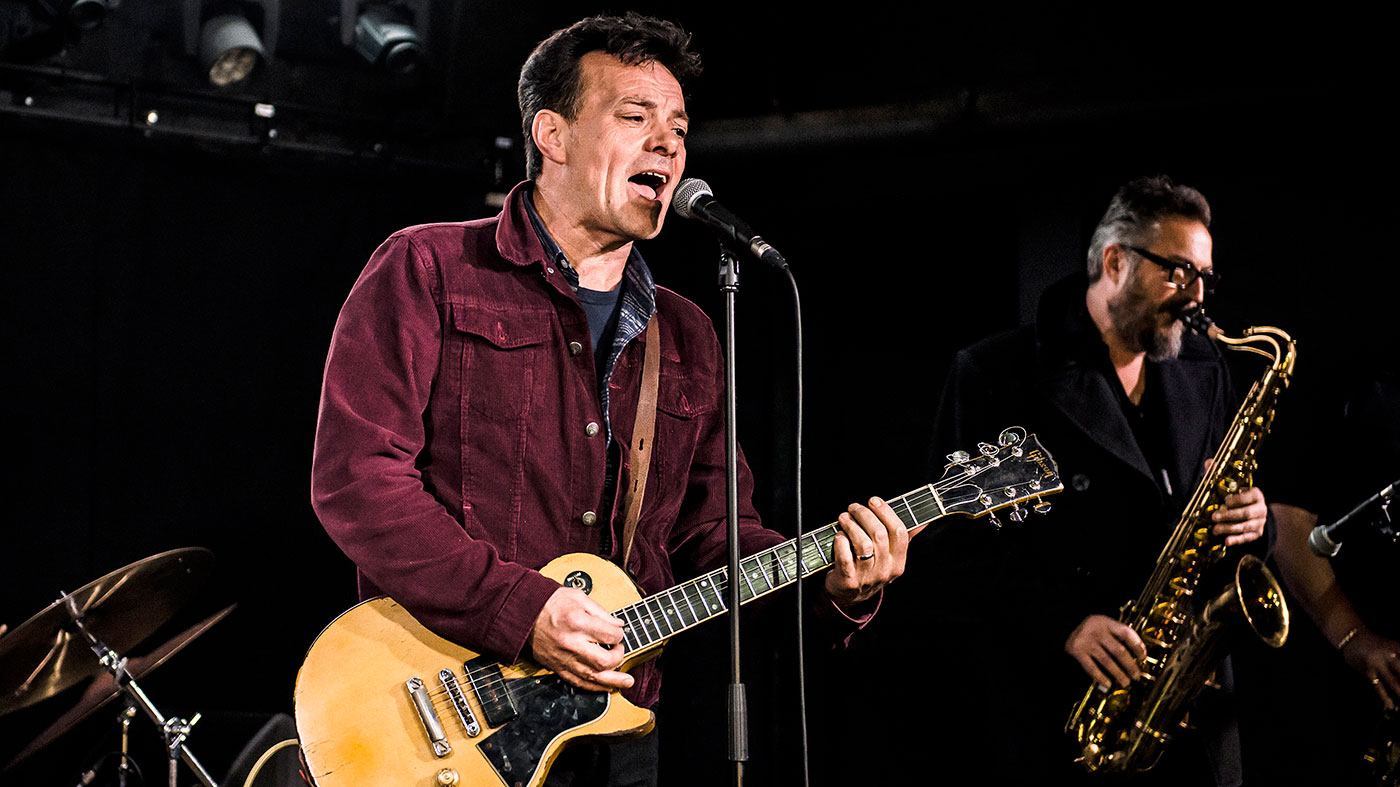James Hunter: “I think guitar playing needs to acknowledge what kind of record it’s on. A solo shouldn’t disappear up its own arse”
We talk to the UK soul star

Want all the hottest music and gear news, reviews, deals, features and more, direct to your inbox? Sign up here.
You are now subscribed
Your newsletter sign-up was successful
British soul sensation James Hunter’s golden voice belies a tarnished backstory that takes in brawls, busking and assorted “bastards”. We met the Essex bandleader to hear about tough times, dodgy amps and the pub fight that almost killed his Les Paul.
The voice is what sets him apart. Equal parts molasses and nicotine, swooping from a honeyed croon to a frayed holler. It’s the kind of voice you’d hear crackling from a dusty 45 vinyl single, evoking late-50s Memphis and long-dead session men. Given all that, it’s a curious thing to hear James Hunter answer the phone in an aitch-dropping cockney drawl, more Colchester market than Stax vocal booth.
“My American wife is starting to develop my accent,” chuckles the British soul sensation. “Which is a terrible thing!” Coming up the hard way on the Essex circuit, Hunter has helmed his six-piece band since the late-80s. But it’s only in recent times that the man dubbed by Mojo as “the UK’s greatest soul singer” has hit paydirt, signing to Daptone, scoring a Grammy nomination and enjoying a critical starburst for latest album Whatever It Takes.
If there’s a downside to being the owner of that once-a-generation voicebox, it’s that nobody ever mentions Hunter’s guitar prowess, his clipped rhythm work and off-the-cuff leads. “Do I feel overlooked as a guitarist?” echoes the 55-year-old. “Well, people do sometimes mention my all-too-apparent limitations…”
So what are your limitations?
“Well, I don’t know if it’s sour grapes, but the stuff I’m incapable of doing on guitar is usually the stuff I don’t want to do. Y’know, the long, sustained ‘guitar hero’ solos. I think guitar playing needs to acknowledge what kind of record it’s on, what the other guys are doing. A solo shouldn’t disappear up its own arse. If I wanted to improve as a guitarist, I wouldn’t mind being able to follow any chord sequence, get really jazzy. I fancy a bit of that. But I know my limitations and I’m comfortable with it. I used to think my voice and guitar-playing compensated for each other. Early on, my whole thing was, ‘If you don’t like my singing, I’ll throw something in on the guitar’ - and vice-versa.”
How about your strengths?
Want all the hottest music and gear news, reviews, deals, features and more, direct to your inbox? Sign up here.
“My co-ordination. I haven’t got the best sense of rhythm in the world, but I’m quite good at doing weird stuff while simultaneously singing. But melodically, as a guitarist, I would call myself a bit limited.”

Signature sounds
Your guitar break on I Got Eyes is pretty tasty…
“Oh yeah. Well, that’s the kind of thing I do, where you go: ‘Is he playing rhythm or lead there?’ It’s a bit of both. It’s like with Johnny Kidd & The Pirates: there was one guitarist who had to adapt their style to rhythm and lead. The Who did it as well. In the old days, there wasn’t another rhythm instrument in the band - nothing between me and the bass - and I’ve kept a bit of that.”
Any other guitar moments you like on Whatever It Takes?
Signature moves? I have this Porky Pig stutter on the guitar. It’s a clipped, staccato sort of thing
“Well, I’m proud of Blisters. It might not sound like much to some people. But I’m playing that track without a pick, and for me, it’s a challenge to get a half-decent noise. Why no pick? Partly to see if I could. And partly because you get a different sound. I mean, I’ll hear Gatemouth Brown and Johnny ‘Guitar’ Watson’s stuff, and I’m surprised how much attack you can get without a pick. On that track, I threw my weight around, turned the amp right up, over everybody’s objections, to an obnoxiously loud level - and got exactly the sound I wanted.”
Do you have any signature moves that identify you as a guitarist?
“Yeah. I have this sort of little ‘stutter’. Like this Porky Pig stutter on the guitar. And it does require the pick to do that. It’s a clipped, staccato sort of thing. It doesn’t grab the attention like Van Halen stuff, but it does startle people sometimes. Or I’ll harmonise with myself on the guitar. Which is an extension of what I’m doing with the horns - y’know, the two horns harmonising with what I’m singing. It’s me trying to get the effect of the vocal groups live on stage… when we can’t afford backing singers.”
So tell us about your Les Paul…
“It’s got a bit of history, that one. People think it’s an old guitar - and it ain’t. I bought it new in 1999, in Angel, London. Around 2005, it got involved in a fight in a pub. This mad bird attacked me at a gig. I didn’t take it personally, because this person attacked everybody. Somebody else interceded and pulled her away. But in the scuffle, she knocked my guitar over and the neck broke. So I had it fixed on by this genius bloke who worked out of Denmark Street - his name’s Philippe [Dubreuille]. He took the remains of the neck and made a whole new one. So it’s a bootleg neck. And it’s better than the old one. Philippe even put the Gibson logo on there.”
What drew you to use P-90s instead of humbuckers?
“Well, I’d never tried humbuckers, so it was purely on word of mouth. Everybody’s going: ‘P-90s have got loads of attack’. And I’ve since bought another Gibson with humbuckers, and the P-90s do have an attack. They’re as clean as you want, and they can get dirty. The neck pickup is actually a P-100 and the bridge is a P-90, given to me by Seymour Duncan. He turned up at a gig around 2006, gave me this thing personally. Of course, since I had a mismatch, I had to tune ‘em in so they wouldn’t phase.”

Les Paul soul
That main Les Paul looks battered…
“I don’t get it overhauled as often as I should, and it’s just taken a beating. It’s the wear and tear of the road. You can thank British Airways as well - they’re good at throwing stuff about. Ask any musician how much they love British Airways [laughs].”
Most people don’t associate the Les Paul with soul music…
“No. Since the 70s, I think it’s been a greebo’s instrument, to use a Colchester term. It’s associated with heavy metal. But if you listen to the first guys on Sun Records, you can hear that a lot of them are playing a Les Paul. It might have been the same one, being passed around. Lowman Pauling played one with The “5” Royales. If you want to hear guitar playing, listen to him.”
Does the Les Paul fit with your voice and the horns?
If you listen to the first guys on Sun Records, you can hear that a lot of them are playing a Les Paul
“Either that or we’ve adapted what we play for the instrument. But yeah, the sound is fat enough to bridge the rhythm section.”
Any other Les Pauls in your arsenal?
“I bought one recently. It’s a lovely-looking thing. It’s a sunburst, 2003, barely been played. But the neck needs doing because the frets are too high. My wife picked it up and said, ‘This neck’s a bastard!’ So at some point, next bit of pocket money, I’m gonna take that in to Philippe, see if he can do things to it.”
So you’re not one of these guys with hundreds of guitars?
“No, I wouldn’t fancy that. They take up a lot of space. I’ve only got a small flat. I do have a Danelectro [DC59], which looks beautiful but isn’t very good. The sound is half-decent, but it hasn’t got enough power or sustain to really help what I do. It’s fun for playing demos, feels nice in your hand. I’ve got another Danelectro baritone, which I use for doing demos on the four-track, and I fake the bass with that.”
We’ve heard that you’re staunchly anti-effects?
“Yeah. I use a Vox AC30, and I used the amp’s vibrato for one song. For years, I struggled along with a Fender Twin. It sounded like knitting needles clashed together, it’s rotten compared [to the Vox]. When I finally bought an AC30 new in 2007, I wondered what I’d been doing all that time. I’ve never looked back since. It’s pretty powerful.
“You get some slightly older models, and they’re a bit dirty-sounding when you don’t want them to be. Slightly nasal. Y’know, you can do the pretty stuff on this and get nasty on it too. I like to have the option. I hate amps where they’re already distorted when you put them on ‘1’. To me, that doesn’t sound edgy - it just takes all the definition out of it. Because you can have a dirty sound with definition at the same time, but some amp-makers think the two are mutually exclusive.”
Busking and bust
You don’t insist on vintage gear then?
“No. I mean, it has a certain cachet, doesn’t it? But y’know, back in the 60s, people weren’t going, ‘Oh, this is an original…’. They’d just go, ‘This sounds good’. And that’s how it should be now.”
The latest album is called Whatever It Takes. So what has it taken?
I’ve never had a gameplan or anything - I’m not organised enough for that
“Well, I drifted into [this career], and I’ve just rolled with the punches. I’ve never had a gameplan or anything - I’m not organised enough for that. I just take life as multichoice - you’re faced with a range of options and you take the least worst [laughs].” Have there been harder moments? “Oh yeah. It’s been a series of troughs interspersed with the odd peak. But a lot of the troughs came in rapid succession, so it might have been one long one. Y’know, the gigs thinning out and you haven’t the [money] to pay your rent was a low point.”
Didn’t you have to go back to a day job at one point?
“Yeah. I was working for an agency, doing labouring. It’s the only other thing I can do. And I went from that to busking because it paid better - and because you met a better class of people on the streets than you did in the agency. They were complete bastards. The only good thing about that was the freedom to work or not work. So you could stay off the dole and if a gig came, you could blow the work off.”
What do you remember about busking in London?
“It was hard. But it did improve your chops and your stamina. You had to be streetwise sometimes. We got in a few scrapes. One time, we got a really aggressive beggar, who appeared to be Glaswegian. I unplugged my guitar and had it over my shoulder. He said: ‘Are you gonna hit me with that?’ And I said: ‘I hope not’.”
You also sang in Van Morrison’s band in the 90s…
“Yeah, I played guitar with him as well. Quite wisely, he wouldn’t have me on any of the sensitive stuff from Veedon Fleece or Astral Weeks. But he’d have me on the blues stuff. In fact, we’d play Shakin’ All Over at the end of his set.”

The greatest
How did it impact your career to get a Grammy nomination in 2006?
“I didn’t feel one way or another. But I thought, putting ‘Grammy-nominated’ on our publicity couldn’t hurt. People see the word ‘Grammy’ and everybody thinks we won.”
If someone hasn’t heard any of your albums, should they start with this one?
The thing about now is that there’s room for everything. And that’s how it should be
“I think they should start with the last one [2016’s Hold On], and then work up to this one. Or work backwards. But don’t go back too far. The last three albums are the ones I’m most proud of. Minute By Minute was the first time we’d worked with [producer] Gabe Roth. The first time we really sounded like we were supposed to.”
How important is it that you record live?
“It helps the feel. You can do it in layers. But if you record the drummer with the bass player first and then you do something on guitar, it’s too late for him to react to it. You’ve got to have call-andresponse. We used to do it in layers and it just sounds sterile.”
Is it hard to stay grounded when Mojo calls you ‘the UK’s greatest soul singer’?
“Well, I’ve always had a big head. But yeah, I did feel very pleased when they called me that. I just don’t like it when anybody calls me blue-eyed soul. I hate that!”
We live in the modern world - why does your vintage music strike such a chord?
“Maybe just because it’s different. The thing about now is that there’s room for everything. And that’s how it should be. There might be a lot of crap… but there was back then, too!”
Whatever It Takes is out now on Daptone.

